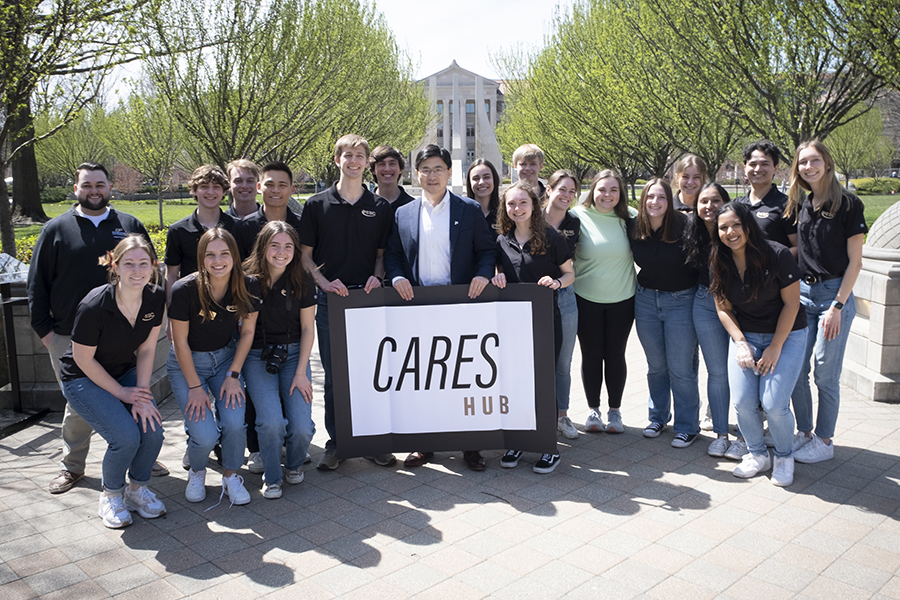New Purdue CARES Hub will offer new pathways for mental well-being for engineering students

As Engineers Week wrapped up with a cookout at the Engineering Fountain on April 7, the Purdue Engineering Student Council (PESC) put a cherry on top of the celebration by presenting a donation to President Mung Chiang designated for student wellness.
The new Purdue CARES (Community, Assistance and Resources for Engineering Students) Hub, to be located on the first floor of the Neil Armstrong Hall of Engineering in the former Minority Engineering Program space, is the result of more than a year of research and planning by PESC members. Through the recent growth of two annual PESC-sponsored events — Industrial Roundtable each fall and EXPO in the spring — the group was able to set money aside for a future student-centric investment to meet their mission of serving students.
“They spent most of 2022 deciding what they wanted to support that would have the most impact,” said Susie Budreau, executive director of parent and family engagement and advancement, who has operated as a pipeline between PESC, Purdue parents and potential donors.
Alexa Stern served as PESC president for the 2022 calendar year and played a pivotal role in representing the student voice and vocalizing the need for the hub.
“Once we came to the idea of the Purdue CARES Hub, we really spent a lot of time solidifying what it would look like. We wanted a concrete space where students could come and get help,” said Stern, a senior in biological engineering from Saline, Michigan. "The wellbeing initiative is something that’s near and dear to my heart."
When the COVID-19 hit and forced students to complete the Spring 2020 semester online, Stern, a freshman at the time, struggled to cope after learning that she wouldn’t be returning to campus after spring break.
“With the snap of a finger, we were gone,” she said, “and it was a very tumultuous time. Being in a time of uncertainty, not really having control over anything, and being away from the environment I was just settling into was hard.”
Stern said she was fortunate to have parents who were supportive in finding assistance for her and good health insurance that enabled her to receive professional help. Realizing that many of her peers don’t share the same advantages further spurred her efforts.
“Students who don’t have good resources or don’t know where to start will have a center to go to on campus without worrying about paying or getting transportation,” Stern said.
When it fully launches in January 2024, CARES, a free service for students, will employ a licensed psychologist, licensed clinicians, a director and an assistant director with a background in public health. The director’s primary role will be training and supervising 30-50 peer counselors who will facilitate walk-in and scheduled appointments to provide low-barrier, high-access support. The assistant director will administer necessary outreach for the hub to help reduce the stigma of needing mental health services. They will implement community-level interventions, well-being programming and education to improve the overall health of the engineering student body.
“We want our students to learn it’s OK to ask for help and to be aware of the pathways we have available for them if needed,” Budreau said.
Stern, acknowledging that there often is a stigma attached to seeking mental health services, said labeling the facility to reflect its focus on overall health will make it more approachable. Also, creating a center exclusively for engineering students was critical.
“Whether it’s trying to decide which engineering school to choose or whether they are struggling with classes or having a hard time fitting in, we felt like having a designated spot with people who understand the innerworkings of the College was important,” Stern said. “Putting the emphasis on Purdue Engineers as people and not just the work they do is a really important step.”
As a service imbedded in the College of Engineering, students will become aware of the hub as freshmen and know where to go when they need help.
“No other engineering school in the nation is doing it this way,” Budreau said.
While the gift is PESC’s largest donation to any student-led initiative, Stern stressed that the hub is a big undertaking that would not have been possible without gifts from external donors.
Chris (BSIE ’95) and Melinda Lister, parents of an industrial engineering student, are members of the President’s Parent and Family Leadership Council and were inspired to give after hearing a Purdue CARES presentation by PESC leaders.
“We believe that mental health is one of the most pressing issues among students today,” Chris Lister said. “The external pressures of friends, grades, social media and being away from home are challenges that we need to acknowledge and offer support whenever possible.”
The parent council is the Listers’ way of keeping informed about the challenges students face as they navigate college.
“We believe in fostering an environment for the whole person, and that includes an Engineering student’s mental health,” Melinda Lister added.
After graduating in May, Stern’s next stop is the University of Maryland where she will pursue a doctoral degree in bioengineering. Her ultimate goal is to work in one of the national labs.
“I couldn't be prouder of PESC,” said Stephen Stewart, PESC’s advisor. “Members took an interest in student wellbeing prior to the pandemic and made it a key priority through the pandemic and beyond when they knew the students they serve were struggling. The Purdue CARES Hub is the result of hundreds of hours of work, research and creative problem solving. I believe it's going to make an important difference for Engineering students and truly exemplifies PESC’s service to the student body.”
